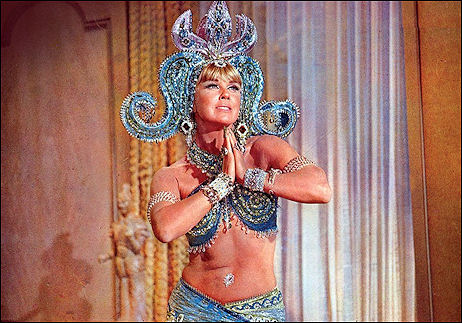Doris Day has passed at age 97. Nothing sad or tragic in this — she lived a long, luminous and bountiful life, if not over the last half-century then certainly during her 25-year heyday. Day was semi-hot between 1940, when her big-band singing career began to happen at age 18, and the launch of her film career in 1948. She was huge throughout the ’50s and early ’60s but it all began to wind down around 1965, when her “world’s oldest virgin” routine finally began to get old.
From “Doris Day Is More Or Less Okay,” posted on 1.10.10:
“Day was fairly great in Pillow Talk, Lover Come Back, Young Man With A Horn and Love Me or Leave Me. I remember something tart and tolerable about her performance in Young At Heart, in which she played the love interest of a dark-hearted Frank Sinatra. And she was reasonably “good” in those bizarre comedies of sexual constipation that she made in the early to mid ’60s.
“And yet it’s hard to think of another veteran of ’50s and ’60s cinema who was more of an icon for uptight middle-class values and zero sexuality.
“I know I suddenly liked Day a lot more when I heard that rumor about her having had an affair with Sly Stone — but that story turned out to be bogus. Day did apparently have a fling with L.A. Dodgers base-stealer Maury Wills.”
Day was offered the Mrs. Robinson role in The Graduate, but turned it down for moral reasons. Mistake.
In 2010 director Douglas McGrath (Infamous, Emma) made a case for Day, then 87, receiving a special career-honoring Oscar. McGrath wrote persuasively and with feeling about Day’s special qualities. She committed to her light-comedy roles, held her own with the likes of James Stewart, Kirk Douglas and James Cagney, and deserved a tribute for the same reason that Cary Grant was tributed in 1970 — i.e., because she was iconic.
The only Day performance I had a problem with was her costarring role in Alfred Hitchcock‘s The Man Who Knew Too Much. I adore aspects of this 1956 thriller (the murder in the Marrakech marketplace, the assassination attempt in Albert Hall) but Day’s grating emotionalism makes it a very hard film to watch. She cries, shrieks, trembles, weeps. And when she isn’t losing it, she’s acting pretentiously coy and smug or singing “Que Sera Sera” over and over.
Day never received that special career-tribute Oscar that her admirers lobbied for off and on.
Day’s Wikipedia bio says that “both columnist Liz Smith and film critic Rex Reed have mounted vigorous campaigns to gather support for an honorary Academy Award for Day to herald her spectacular film career and her status as the top female box-office star of all time.”
It also says “while Day turned down a tribute offer from the American Film Institute, she received and accepted the Golden Globe’s Cecil B. DeMille Award for lifetime achievement in 1989. In 2004, Day was awarded the Presidential Medal of Freedom but declined to attend the ceremony because of a fear of flying. Day did not accept an invitation to be a recipient of the Kennedy Center Honors for undisclosed reasons. Day was honored in absentia with a Grammy for Lifetime Achievement in Music in February 2008.”

Doris Day in The Glass-Bottomed Boat












